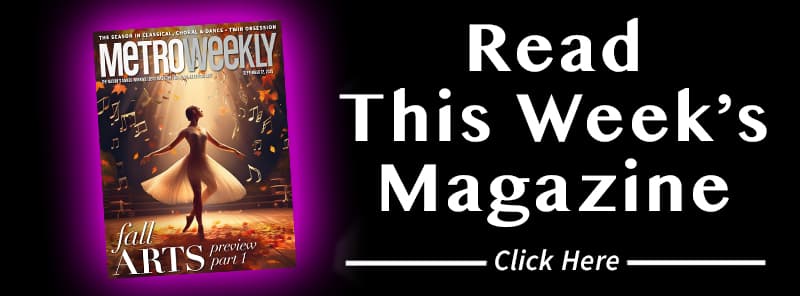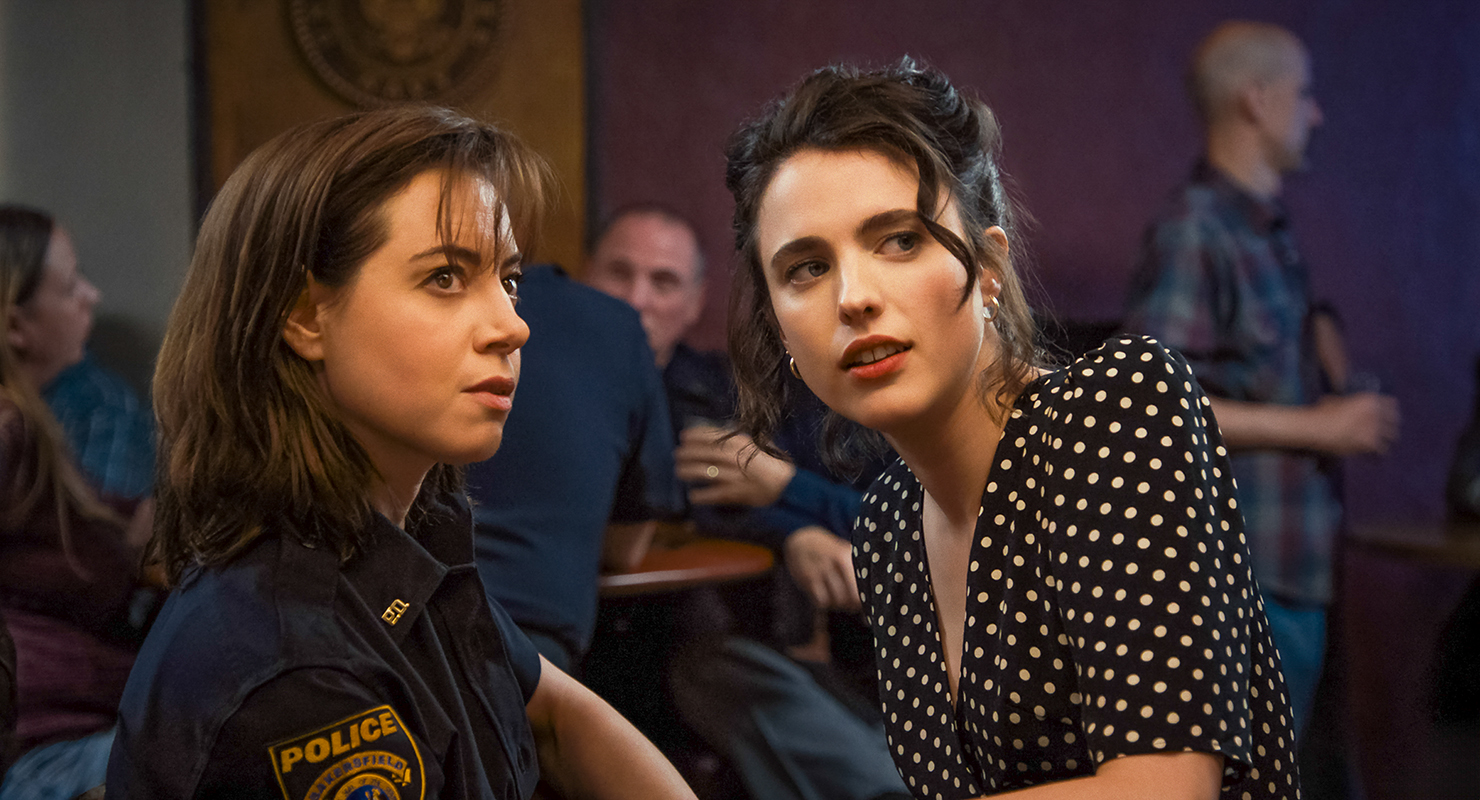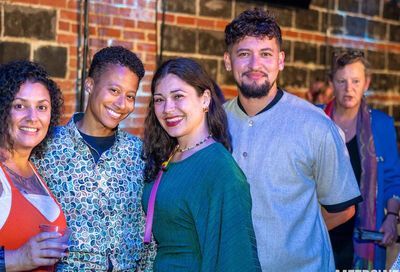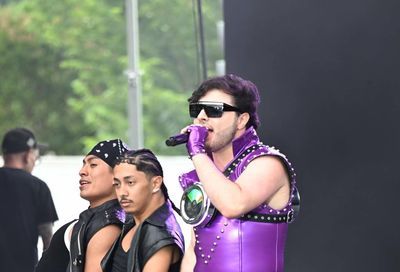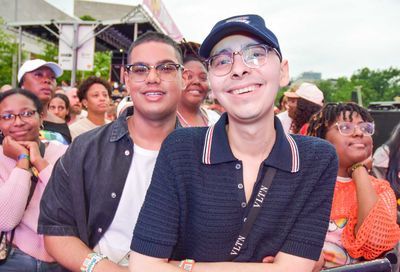Girl on Film
Margaret Murray and One in Ten get ready for the Reel Affirmations Film Festival
Eighteen years ago, Margaret Murray faked her way into a life in film.
A single mom living in Florida, Murray was working in a bank when an opportunity arose at a new retail store called Blockbuster Video.
”There was a phone test that they gave every applicant,” recalls Murray. ”They asked you 10 questions about different directors and genres of film. I called up, took the test and failed because I didn’t know much about film.”
Not one to give up, Murray researched the answers and called again the next day, this time scoring a nine out of 10. She was asked to come in for an interview. Murray chuckles over what happened next.
 Murray |
”I thought, ‘Well, I got the job and it was so easy! I can just bluff my way through it.”’ I got to the interview and they gave me a 125-question test.” She scrunches her face. ”I did horribly!”
Still, fate intervened in the form of a Blockbuster store manager who took a liking to Murray. He gave her the job despite her lack of cinema expertise, handing her an armload of film studies books and advising her to watch two to three different movies a day from the store to expand her knowledge base.
Murray had found her passion.
Two decades, thousands of movies and several jobs later, including a successful stint as the executive director of the Tampa International Gay and Lesbian Film Festival, Murray has arrived in Washington as the new executive director of the GLBT cultural organization One In Ten. The organization produces the Reel Affirmations Film Festival, which kicks off its 16th year on Thursday, Oct. 12.
Blessed with an easygoing, warm nature, the 41-year-old Murray conveys the air of a youthful bohemian. Acknowledging her role as an enthusiastic conduit for artistic visions, Murray’s future plans for One In Ten include expanding its mission to embrace local GLBT arts in all forms. While Reel Affirmations is the linchpin that keeps the organization afloat, Murray sees possibilities that extend well beyond One In Ten’s reel life.
”Ideally,” she says, ”I would love to see a week-long event of gay and lesbian art openings all over the city celebrating GLBT artists. Maybe even a street fair and collector’s dinners and art auctions. It could include performance art — there’s so many things.”
Right now, however, Murray needs to make it through her first Reel Affirmations, which, for her, will be a 10 day meet-and-greet with the GLBT community. Already, Murray has put her stamp on the festival, negotiating a deal with Landmark E Street Cinemas to serve as an exhibition site when the DCJCC Goldman Theater became unavailable.
Murray took a few minutes out of a harried schedule to share her views on Reel Affirmations and GLBT film festivals in general, as well as a few personal details, including the benefits of having a daughter who, like mother, turns out to be happily, healthily queer.
METRO WEEKLY: Let’s start with a little personal background. Where were you born and raised?
MARGARET MURRAY: I was born in Jacksonville Beach, Fla., and grew up in St. Petersburg. I grew up on a farm, actually. We had horses, chickens, all that good stuff. It was a really rural upbringing. When I was 8, I wanted a pony and my parents bought me one. Then I wanted another one and another one, so we had to move out of the town we lived in and move to a farm.
MW: Most young girls say ”I want a pony” and the parents say, ”Sure, right” but you got a whole farm.
MURRAY: [Laughs.] Yes. They were indulgent. My mom was a bartender and my dad worked for the state. I’m sure it wasn’t entirely me. I think they wanted to live on a farm. It was primarily a way to get us out of the city and back to nature.
MW: When did the gay realization kick in for you?
MURRAY: I knew pretty early, but I didn’t come out till late.
MW: How late?
MURRAY: In my 30s.
MW: Did the folks take it okay?
MURRAY: My family is very open and my daughter is gay as well, so they’re fine with it. I’ve met very few parents who have ever said, ”Oh, that’s a complete surprise,” when their child comes out. I remember when I was 13 or 14, my mom would say, ”You should go out with this girl, you should make friends with this girl.” Looking back, they were all gay. So I think she knew.
MW: You slipped something in there — ”My daughter is gay as well.”
MURRAY: [Laughs.] Oh, yes. I have a 20-year-old daughter who’s gay.
MW: When did she come out to you?
MURRAY: Several years ago. I was running the Tampa Gay and Lesbian Film Festival at the time.
MW: How did you respond?
MURRAY: I said that I was glad, because teenage girls were much prettier than teenage boys, and good for her. I think almost from a selfish standpoint I breathed a sigh of relief because I felt she was finally out of a dangerous path of getting pregnant early.
MW: Let’s jump a few years forward to the present. How did the position at One In Ten come about?
MURRAY: I knew of One in Ten because we overlap with the Tampa Gay and Lesbian Film Festival. I heard they were looking, so I communicated back and forth and thought, ”I’m just going to give it a shot. I was ready for a change, ready to leave Florida. I was going to be a ”middle-aged arts lady” if I stayed there much longer. I thought this is not where I ultimately want to be.
MW: Both Carlos Arias, a very charismatic leader who ran the organizations for many years, and Daniel Meloy, who followed him, functioned primarily on the business side. You, however, come with a different skill set, having programmed the Tampa festival for several years. Are you planning to put your personal stamp on the festival given your experience?
MURRAY: [Programs Manager] Joe Bilancio is so good, and has such a reputation, that I have no intention of stepping into programming. Film-wise, I think my role can be to make a strong case for showing certain movies — ”Maybe we should branch out and try this or that.” But I do see myself taking more of an active stance on visual arts and non-film related programming — like a spring visual arts festival — so that we can grow into a more rounded arts organization.
 |
MW: Reel Affirmation has grown into one of the most respected gay and lesbian film festivals in the country. Are you planning on anything different with regard to the programming?
MURRAY: A lot of the programming was in place before I came on board. I didn’t start until the end of May, and Joe has my complete support on what he does. We are showing [John Cameron Mitchell’s] Short Bus, which a lot of film festivals are shying away from.
MW: I’m thrilled you’re showing it. It’s the boldest film the festival has ever opened with. Do you worry, what with its hardcore sexual aspects, that it might spark unwanted controversy?
MURRAY: No, because I know what a great film it is. And that’s what a film festival is about — showing a film like Short Bus. I know people are going to love the film. It’s cheeky, it’s audacious, it’s artistic, it’s sexy, it’s subversive and it’s also very loving. I think that it’s going to spark conversation — and that’s always a good thing.
MW: Your closing night selection is just as important — the first film in a decade by Maria Maggenti, the woman who made The Incredibly True Adventures of Two Girls in Love.
MURRAY: Yes, Puccini for Beginners. It’s got Gretchen Mol in it, so I’m happy.
MW: And then there’s everything in between. It looks like a solid lineup. Gay and lesbian film festivals are often dependent on the quality of what’s out there at the time and the topic of the moment. Do you see any trends?
MURRAY: Right now, we’re seeing so many documentaries being created on gay marriage. In a few years, that’s going to go away as an issue and something else is going to come up. I think that the next trend we’re going to see in gay and lesbian filmmaking is films about transgender issues. We’ve already seen a huge increase in that.
There’s more of an awareness of female filmmakers out there. Women are saying, ”I am going to make this film. A story about a girl coming out is just as valid and important and beautiful as a story about a boy coming out.” And there’s also more of a willingness to finance those films because a lot of these female filmmakers are coming up through the ranks of television where they can build a resume.
MW: Reel Affirmations is healthy now, but looking ahead, do you fear there may not be a need for GLBT film festivals in the future, what with more and more movies becoming quickly available on DVD, or via online download, and on GLBT broadcast outlets like Logo? Do you fear the emergence of apathy in the audience, who may just shrug off the event by saying, ”Well, you know, it will be on DVD or I’ll be able to download this sometime, so I’ll wait.”
MURRAY: I think that that is a possibility. But I think film festivals will always be able to adapt and create partnerships.
In the not too distant past, GLBT filmmakers had one outlet for their movies: a gay film festival. If they were lucky, they were accepted into one of the big ones and then found a distribution outlet through Wolfe or TLA. Now, with the proliferation of outlets for gay content, I think that film festivals offer more opportunities: If your film generates buzz and finds an audience, Logo or here! TV can pick it up, or it can be offered wider distribution through a studio. So it’s a very symbiotic relationship. And we offer an opportunity for acquisitions people to get a sense of what’s resonating with audiences. I’ve seen a huge increase in the number of programming scouts that show up to gay film festivals.
You also can’t discount the feeling of sitting in a theater with 1,000 other gays and lesbians and watching a film about your life. You just can’t get that in your living room.

Photos from the 2005 Reel Affrimations Opening Night Party
MW: But your challenge is the audience. How do you keep the audience coming, how do you keep the audience interested?
MURRAY: By making the festival experience as amazing as possible. It’s a cultural aspect. You can look at going to the film festival in so many different ways. Some people go to see their friends, some go to meet new friends, some go to be educated, some go to make themselves feel smarter….
MW: Some go just to see naked guys having sex in the movies.
MURRAY: [Laughs.] There is that.
MW: We sometimes get complaints from gay filmmakers because we didn’t write a flattering review of their movie. They are outraged that a gay publication is unsupportive of a gay artist. But we don’t feel we should provide knee-jerk support.
MURRAY: Your art should stand on its own merits. And I don’t think that anyone should expect favors from the gay community if you’re gay. You don’t get a free pass. That’s my feeling.
MW: Exactly. We’re not obligated as a gay publication to fawn over it just because a gay person made it.
MURRAY: And we’re not obligated as a gay film festival to show every film made by a gay filmmaker.
MW: Still, film festivals are a place where new talents can be discovered and nurtured. Brian Sloan, a Marylander whose short Pool Days helped him make a move into features, including last year’s WTC, is a great example.
MURRAY: And that’s one of the best things about a film festival. You are an incubator for talent and you can cultivate an audience for a director. And that’s amazing because the market place is pretty brutal for filmmakers. So many times you have one shot and that’s it. That’s one of the strengths of the film festival.
MW: What do you look for in a movie?
MURRAY: For me it’s hard, because I’m so picky. People hate going to the movies with me. I really look for a story that hasn’t been told yet — that’s the most compelling thing for me. And sometimes I get bogged down in the technical aspect — all I notice is the lighting and sometimes I notice the editing — so it’s really hard to say. It depends on my mood. But I do look for a good story and inventive camera work.
MW: For a newcomer, you’ve been very warmly received by the community. Everyone I mention you to absolutely adores you. What are you doing right?
MURRAY: I don’t know. But the festival hasn’t started yet. The proof is in the pudding. I’m excited to be here and I like what I’m doing and I’ve met really amazing people. It’s always hard to follow in someone’s footsteps — and Carlos has such a close relationship with the film festival, but he’s been incredibly welcoming. I don’t know, I guess my enthusiasm kind of rubs off on people.
For more information on the upcoming Reel Affirmations 16, which runs from Oct. 12 through Oct. 21, please call 202-986-1119 or visit www.reelaffirmations.org.
Support Metro Weekly’s Journalism
These are challenging times for news organizations. And yet it’s crucial we stay active and provide vital resources and information to both our local readers and the world. So won’t you please take a moment and consider supporting Metro Weekly with a membership? For as little as $5 a month, you can help ensure Metro Weekly magazine and MetroWeekly.com remain free, viable resources as we provide the best, most diverse, culturally-resonant LGBTQ coverage in both the D.C. region and around the world. Memberships come with exclusive perks and discounts, your own personal digital delivery of each week’s magazine (and an archive), access to our Member's Lounge when it launches this fall, and exclusive members-only items like Metro Weekly Membership Mugs and Tote Bags! Check out all our membership levels here and please join us today!







